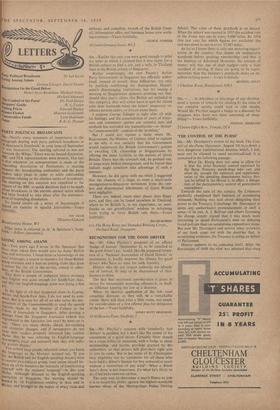SIR,—Earlier this year you were good enough to print my
letter in which I claimed that it was easier for a British subject to find a job, and a wife, in Thailand than in the British colony of Singapore.
Rather surprisingly, the new People's Action Party Government in Singapore has officially under- lined, instead of erased, these difficulties, not only by publicly confirming the Immigration Depart- ment's discouraging restrictions, but by issuing a warning to Singaporean spinsters pointing out that, should they marry aliens (the British are included in this category), they will either have to quit the island with their husbands when the tatters' temporary re- sidence permits expire, or live on alone there. I suppose George Edinger is right after all with his findings, and the accumulation of years of bitter- ness and resentment against our colonial men and methods has corroded any humanitarian—or 'domes- tic Commonwealth'—aspects of the 'problem.'
But I could not repress a smile when Mr. Rajaratnam, the Minister of Culture, tried to explain to me why it was unlikely that his Government would reciprocate the British Government's gesture in awarding UK citizenship to Singaporeans by offering the same facilities to the natives of Great Britain. There was the constant risk, he pointed out, of large-scale Indian immigration, and he feared that Indians might somehow take advantage of such a measure.
However, he did agree with me when I suggested that the chances of a large, or even a small-scale immigration-to-Singapore movement from the rest- less and discontented inhabitants of Great Britain were negligible.
There are, indeed, much nicer places than Singa- pore, and they can be found anywhere in Thailand, where to be British is, in my experience, an asset, thanks to our grandfathers' wisdom in refraining from trying to force British rule there.—Yours faithfully, DAVID MORRIS clo The Hong Kong and Shanghai Blinking Corpn., Orchard Road, cingapore










































 Previous page
Previous page